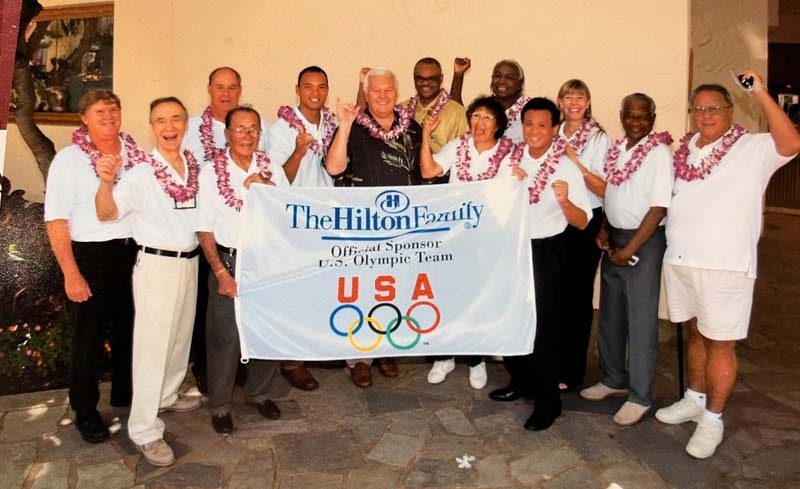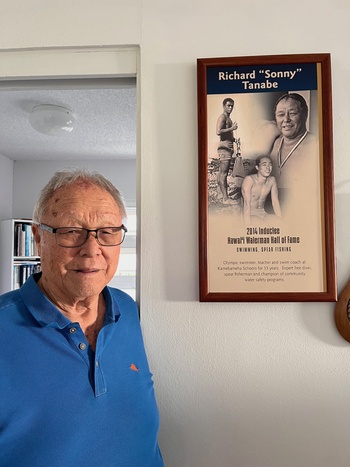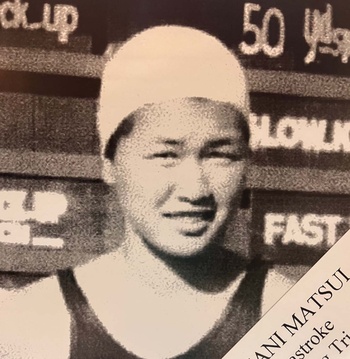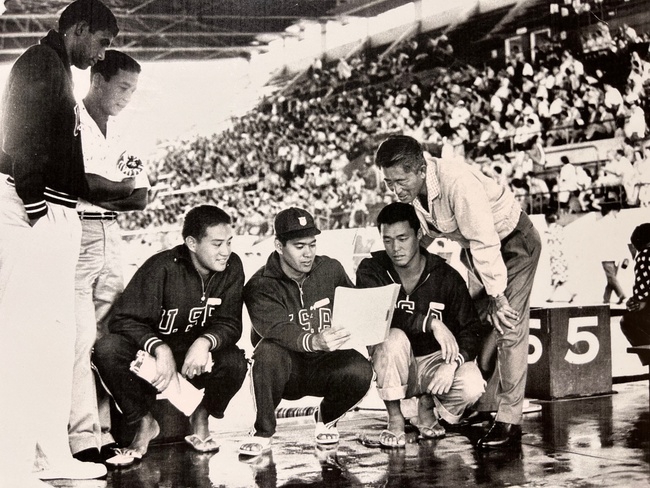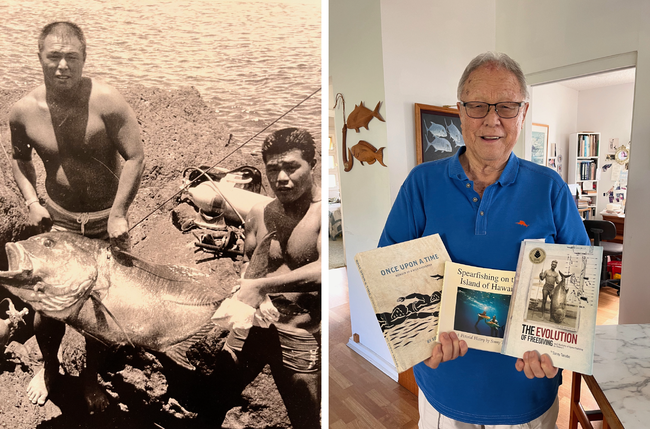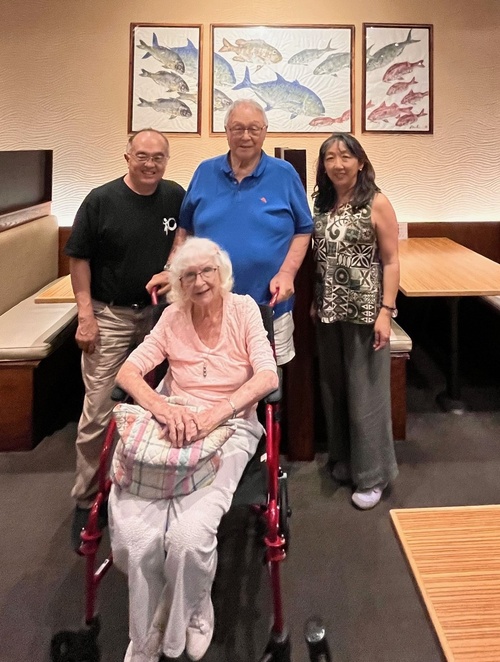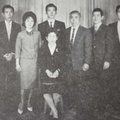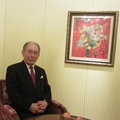As Nikkei, each of us has various topics that interest us. Thus, we have some who have studied about prominent academics, researchers or politicians. In my case, in recent years I have focused on Nikkei Olympic athletes. Thanks to the Akane Museum in Mexico and the Chiyoteru Hiraoka Museum in Peru, I have had the opportunity to present a first exhibition on Nikkei Olympic athletes in Peru in 2022.
Something I noticed in this work was that the largest number of athletes came from the United States and, within them, the majority were of Hawaiian origin. This led me to continue looking for information and, thanks to this, I had the opportunity to contact one of the Olympic athletes from Hawaii who, although he did not officially win an Olympic medal, for me he has won more than that and all my recognition; I hope you will too after you read about the story of this great person, Richard Tsugio 'Sonny' Tanabe.
At 90 years old, he has dedicated much of his life to collecting data on all Hawaiian Olympic athletes, of all time, and recently he shared with me the data of 20 of them who are Nikkei. This served to complete a list that was started by the Japanese Immigration Museum in Yokohama in 2016, and to which I have contributed thanks to the data provided by him from 1940 to the last of them in Paris 2024.
As a curious fact, he mentions as the first Nikkei Olympian of all time the 15-year-old Hawaiian swimmer Fujiko Katsutani who, despite not having held the 1940 Olympic Games (due to World War II), having earned her place in the qualifying rounds held in the city of Portland, Oregon, in the 200-meter breaststroke event, her name was recorded as the first Nikkei Olympic athlete and this is largely due to the work of Sonny Tanabe.
Sonny was born on December 14, 1934 in the city of Hilo on the island of Hawaii, where he began swimming under the guidance of his coach “Sparky” Kawamoto. At the age of 17 he participated in the national championships of the Amateur Athletic Union in Newark, in backstroke and individual medley, and later, in 1954, he participated with the American team formed by the Hawaiian Nikkei stars Ford Konno and Yoshi Oyakawa, who faced at that time the powerful Japanese team.
From 1955 to 1957 he was a student at Indiana University where, in addition to graduating with a bachelor’s and master’s degree in Health and Physical Education, he was an outstanding athlete in swimming, becoming an All American, standing out in the individual medley, freestyle, and butterfly events, in addition to having set a record in the 100-yard butterfly and 400-yard medley relay, and an American record in the 200-yard individual medley for the NCAA event.
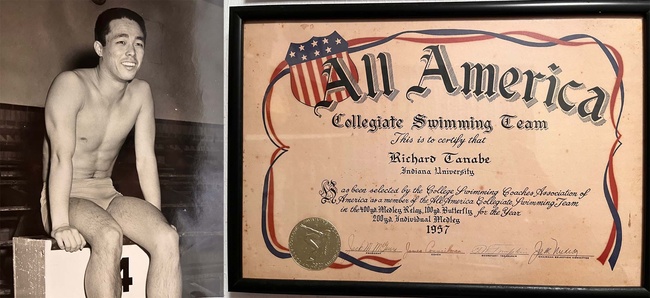
In 1956, he competed in the Melbourne Olympics in Australia, where he competed in the 200-meter freestyle for the 4x200-meter relay heats, where he was a substitute. The United States team earned a place in the final, where they eventually won the silver medal. Unfortunately, according to the rules of that time, he was not worthy of a medal (as they are today), since in those days only the four participants in the final could be worthy of that distinction.
After the Olympics, he enlisted in the United States Navy, returning to Hawaii and now serving 33 years as a teacher, swimming and water polo coach at the Kamehameha School in Honolulu. During those years, he continued his aquatic activity as a volunteer for the Red Cross, a NAUI diving instructor, and, as a hobby, he developed a special interest in underwater sport fishing, being a pioneer and even writing three books on this sport: “Once Upon a Time. Memoirs of an Aquatic Man”, “Spearfishing in the Hawaiian Islands. A Graphic History” and “The Evolution of Spearfishing. History of Spearfishing in Hawaii”.
All of this aquatic activity has led him to various leadership positions in spearfishing, the YMCA, Hawaii's natural resources conservation, and as president and vice president of the U.S. Olympians from Hawaii. In 1955, he was inducted into the Indiana Swimming and Diving Hall of Fame and was recognized with the Balfore Award for his swimming achievements. In 2003, he was also inducted into the Hawaii Swimming Hall of Fame, and in 2014, into the Duke Kahanamoku Foundation Hawaii Waterman's Hall of Fame.
In February 2024, at a renowned restaurant, Duke’s in Waikiki on Oahu, Sonny was awarded the Ho'okahiko Award, which is given to individuals who have dedicated their lives to the preservation of traditional activities such as artists, artisans, farmers and athletes. Richard 'Sonny' Tanabe, in addition to being a citizen recognized for his educational, sports and a life dedicated to aquatic activities, is an excellent human being and husband who cares, day by day, for his beloved wife Vicky, who is in a wheelchair, and is generous in sharing all the information he has about Hawaiian Olympic athletes with anyone who requires it.
Thank you, dear friend.
© 2025 Alberto Teramoto Ohara


